Turning the tap on prosperity: How clean water transformed a food seller’s life
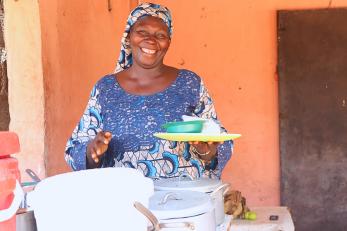
When water comes from improved and more accessible sources, people spend less time and effort physically collecting it, meaning they can be productive in other ways. This can also result in greater personal safety and reduce musculoskeletal disorders by reducing the need to make long or risky journeys to collect and carry water. Better water sources also mean less expenditure on health, as people are less likely to fall ill and incur medical costs and are better able to remain economically productive. These are findings from research conducted by the World Health Organization.
This truth is vividly illustrated through the experience of Christiana Buba, a beneficiary of the Small Town Water, Sanitation, and Hygiene (STWASH) Activity water scheme in Viniklang, a small town in Adamawa State. Through access to clean water provided by STWASH, Christiana has transformed her business, demonstrating firsthand the profound impact of clean water on livelihoods and community empowerment.
Christiana Buba is a local food seller who prepares traditional delicacies such as shinkafa (rice), tuwon shinkafa (rice swallow), miyan kubewa (dried okra soup), and miyan taushe (pumpkin stew) for profit. Her business requires the use of a lot of water, but due to the lack of accessible clean water, she had to buy water from vendors. This cost her about ₦500 daily from her profit of between ₦1500 and ₦2500. During the dry season, the cost could rise to ₦1000.
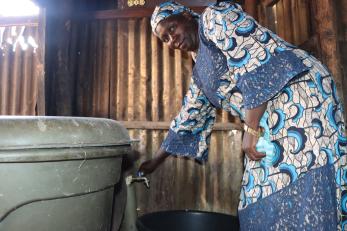
Before STWASH's intervention, Christiana either fetched water from a stream (which was always salty) or paid vendors for water. This occasionally caused delays in her cooking, leading to lost customers who typically bought from her during the day. The lack of water meant she couldn't always maintain hygiene standards, impacting her business's success. Many businesses and homes faced similar challenges, especially during the dry season when water scarcity severely affected commerce in Viniklang.
Spending ₦500 daily on water amounts to ₦3500 weekly, ₦14,000 monthly, and ₦182,000 annually. This substantial expense, combined with other household bills, highlights the severe financial strain caused by water insecurity for low-income families in Viniklang. Many families cannot afford this cost, and even those who can often face inconsistent water availability, resorting to drawing water from wells and streams.
Christiana’s experience changed with the USAID-funded Small Town WASH Activity’s intervention in Viniklang, Adamawa state. The Activity constructed a 50,000-liter and 30,000-liter capacity water borehole facility, supplying water to different fetching points within the community. Residents, including Christiana, connected pipes from the borehole to their shops.
“With the intervention of STWASH, I have improved my hygiene, sanitation, and health practices in my shop. I encourage customers to wash their hands before eating, I clean the plates and pots immediately after cooking, and due to plenty of water, I cook more meals. More customers have started coming to my shop because I have a variety of meals, and my food even tastes better,” Christiana shared.
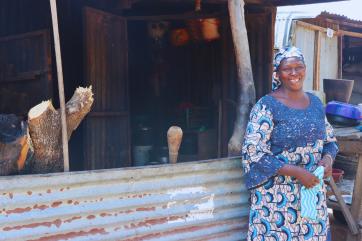
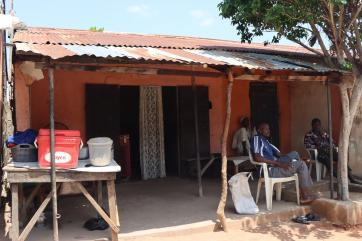
As part of the engagement process, the Activity supported community leaders in establishing a Water Consumers Association (WCA) to oversee the effective operation and maintenance of the facilities. They were trained in hygiene promotion, maintenance, and bookkeeping to ensure accountability for any monetary contributions made towards facility maintenance. The WCA also monitors the borehole usage by rationing – turning it on at specific times during the day.
“We contribute a small token to maintain the facility because we cannot depend on Mercy Corps to maintain it after building it for us,” Christiana explained.
Expressing with a bright smile, she added, “STWASH has really helped us by building this water scheme. Now I don’t have to buy water, which has helped me save a lot. My expenses have become my profit, my business is thriving, and I even increased the salary of the girls assisting and learning from me. With the increased salary, they can now train themselves in school and provide for their basic needs.”
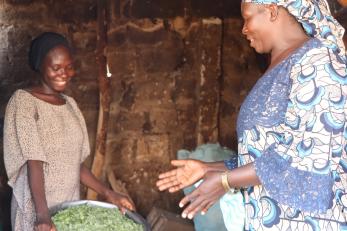
Mary Idiris, an 18-year-old girl who graduated from secondary school three years ago but couldn’t further her education due to financial constraints, shared her story: “I was walking down the road one day and decided to approach Madam Christiana, asking if I could learn how to cook instead of being idle at home. I offered to work for free. Christiana accepted me with open arms, saying she couldn’t let me work for free and would give me a monthly stipend, even though she didn’t have enough to pay me at the time. I have worked with her for three years, and in that time, we have grown rapidly. She increased my salary, and now I support my family with their farming. With the profits from the farm, we are saving to pursue my higher education and reduce our household’s financial struggles. Not only can I go back to school, but I have also learned cooking skills that will help me survive anywhere without begging for money.”
Christiana went further to say “I also plan to employ more youths. That way, there will be fewer out-of-school youth and unemployed young people who can use the money to support themselves in school and meet their basic needs.”
Through the STWASH water scheme, Christiana’s business has flourished, empowering her and her staff. It has also transformed their lives and significantly impacted their livelihoods.
About STWASH
The Nigeria Small Town WASH Activity (STWASH) is a 5-year program funded by USAID and implemented by Mercy Corps in partnership with WaterAid in Borno, Yobe, Adamawa, Abia, Imo and Delta States.
The program aims to strengthen the capacity and accountability of key institutions to provide and sustain access to water and sanitation services for 140,000 individuals in small towns across northeastern Nigeria.
The program will facilitate the economic recovery of crisis-affected communities and strengthen the capacity of state governments in providing essential WASH services, while creating and sustaining an enabling environment for Small Towns Water Supply and Sanitation Agencies (STWSSAs) and Water Consumers Associations (WCAs) to operate.
The small towns where the program is being implemented include Mandara Abdu of Biu LGA, Wagini/Anguwan Baba Adamu of Shani LGA, and Kwaya of Kwayakusar LGA; Dumne of Song LGA, Vinikilang of Girei LGA, and Gangarasso-Sangassumi of Ganye LGA; Lailai of Potiskum LGA, and Kelluri of Geidam LGA.